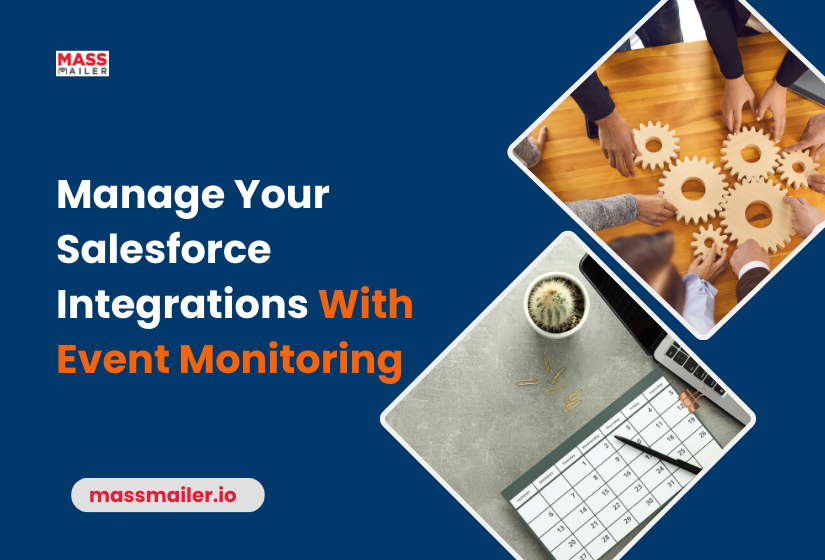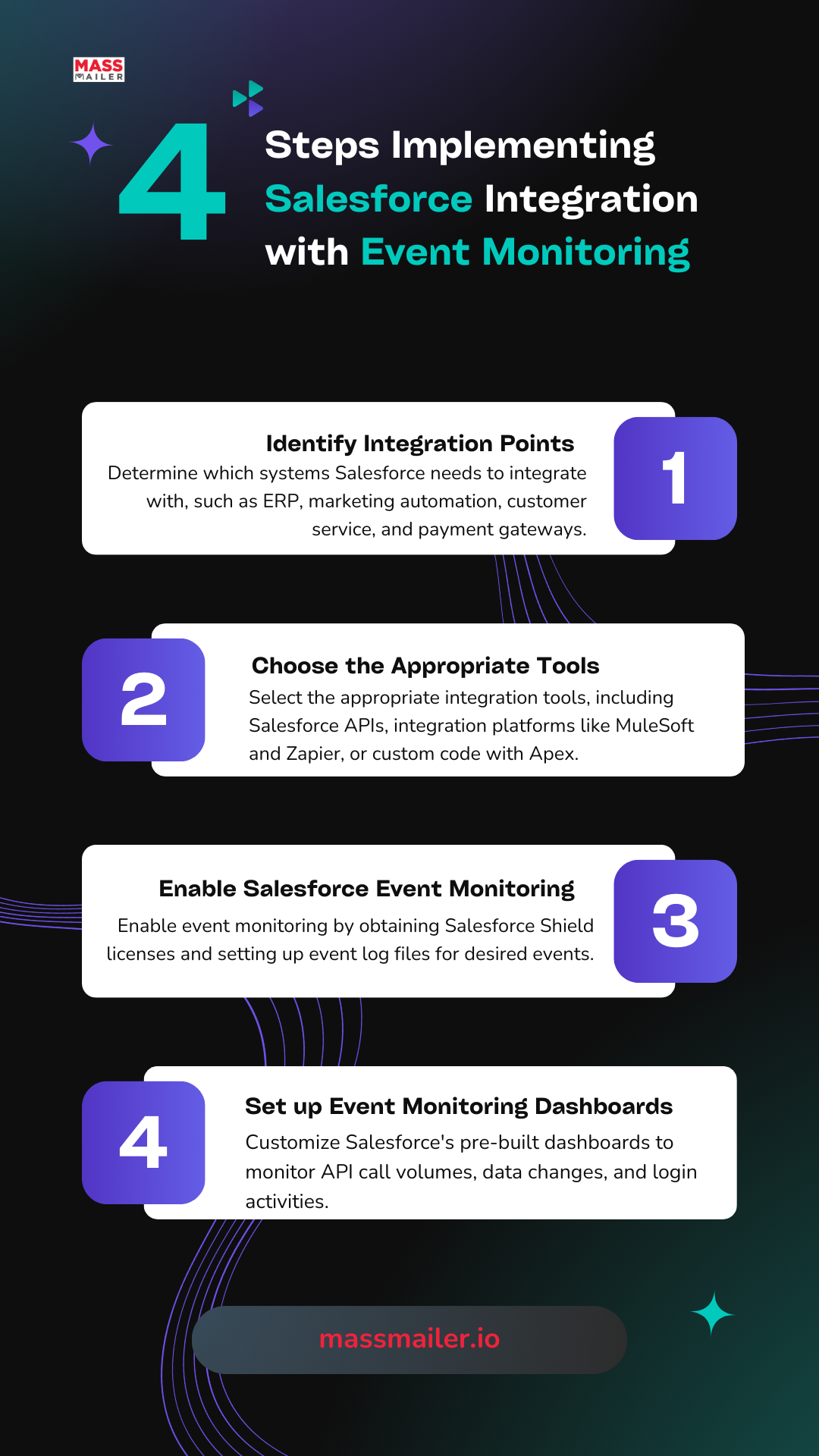Manage Your Salesforce Integrations With Event Monitoring
Integrating multiple systems and programs is essential for managing a profitable company. For that, Salesforce is a handy option. It is a powerful CRM (customer relationship management) platform with many integration options that ensure smooth data flow, operational effectiveness, and a single view of client information across several platforms.

However, did you know about the risks associated with your Salesforce integrations? If not monitored, it can have potential threats like data security breaches, which can lead to potential misconfigurations and compliance slip-ups.
This article will discuss how to manage integrations to ensure the safety and smooth operation of your company’s activities.
Understanding Salesforce Integrations
Salesforce connectors let many software programs talk to Salesforce, enabling real-time data flow between systems. This may be as simple as linking your email marketing platform with Salesforce, payment gateways, ERP systems, or customer service tools.
These integrations are essential for maintaining data consistency, streamlining processes, and providing a single view of client data across multiple platforms.
The Importance of Event Monitoring in Salesforce Integrations
Event monitoring provides detailed records and reports of user actions within the system. It monitors a number of events, including record accesses, data exports, and login attempts. Additionally, event monitoring supports data security, compliance, and operational integrity when linked with other systems.
Benefits of Salesforce Event Monitoring
- Security: Through recording login attempts, API calls, and data changes, Salesforce event monitoring enables you to keep an eye on potentially harmful activity. This allows you to react quickly to security threats.
- Compliance: Several sectors require stringent adherence to strict regulations. Event monitoring provides the audit trails required to comply with regulations such as HIPAA and GDPR.
- Performance Optimization: Examining event logs can help you find and fix performance bottlenecks in your integrations, ensuring the smooth operation of your systems.
Implementing Salesforce Integrations with Event Monitoring
To manage Salesforce integrations with event monitoring, follow these steps:
Step 1: Identify Integration Points
First, determine which systems and programs Salesforce requires integration with. The common integration points are as follows:
- ERP Systems: Link financial, order, and inventory information.
- Marketing Automation: Integrate email campaigns, lead scoring, and customer segmentation.
- Customer Service: Connect Salesforce data with customer contacts and support tickets.
- Payment Gateways: Ensure that transactions and payment documentation are handled smoothly.
Step 2: Choose the Appropriate Tools
Salesforce provides a variety of integration tools and APIs.
- Salesforce APIs: Salesforce APIs include the Streaming, Bulk, SOAP, and REST protocols.
- Integration Platforms: Tools like MuleSoft and Zapier offer pre-built connectors and integration workflows, known as integration platforms.
- Custom Code: Using Salesforce’s own programming language, Apex, you may need to create custom solutions for more intricate integrations.
Step 3: Enable Salesforce Event Monitoring
Your environment must enable Salesforce event tracking. This consists of:
- Getting Event Monitoring Licenses: The Salesforce Shield suite includes event monitoring; therefore, the relevant licenses are required.
- Putting Event Log Files in Place: Decide which events you wish to monitor and set up the event log files appropriately.
Step 4: Set up Event Monitoring Dashboards
Pre-built dashboards and reports from Salesforce let you see event data. You can modify these dashboards to monitor specific integration-related events, for example:
- API Call Volumes: Keep track of the number of API requests your integrations make
- Data Changes: Track modifications to important data fields to guarantee data integrity.
- .Login Activities: Watch login attempts, particularly those coming from suspicious IP addresses or locations.

-
Best Practices for Managing Salesforce Integrations with Event Monitoring
Use these best practices to maximize Salesforce integrations with event monitoring:
1. Ensure the Security of Data
Integrating many systems should start with data security. Salesforce Shield event monitoring allows you to enhance your security protocols.
- Sensitive Data Encryption: Protect sensitive data in transit and at rest using Salesforce Shield encryption.
- Installing Multi-Factor Authentication (MFA): Make sure only authorized people may use your systems.
- Analyzing Event Logs Continuously: Monitor event logs for any unusual activity.
2. Preserve the Consistency of Data
The reliability of your integrations is mostly dependent on data consistency. To this end,
- Middleware Solutions: Thanks to middleware platforms, Salesforce and other systems can synchronize data in real-time.
- Implementing Data Validation Rules: Ensure that Salesforce data meets specific requirements for approval.
- Organizing Frequent Data Syncs: Plan routine data synchronization tasks to guarantee system consistency.
3. Elevate Integration Performance
It is important to prioritize performance improvement to ensure the seamless operation of your integrations.
- Supervising API Use: Track API call volumes and make sure you don’t exceed Salesforce’s API restrictions.
- Examining Event Logs: Find performance bottlenecks and streamline your integration processes with event monitoring data.
- Rationalizing Resources: Make sure your infrastructure can support the load your integrations provide.
4. Check Compliance
Adhering to data privacy laws will help your organization avoid legal dangers. See to it that:
- Keeping Audit Trails: Salesforce event monitoring makes it possible to keep extensive audit trails of user actions and data changes.
- Data Encryption: Using Salesforce Shield encryption, you can safeguard private data and abide by data protection regulations.
- Frequent Audits: To guarantee compliance with industry norms and laws, audit your data flows and integrations on a regular basis.
Use Cases of Salesforce Integrations with Event Monitoring
Here are some useful scenarios in which Salesforce connections with event monitoring can be quite beneficial:
1. Financial Services
Financial firms deal with a ton of private information. When companies integrate Salesforce with their main banking systems and enable event monitoring, they can:
- Monitor and audit financial transactions to identify potential fraud. iiiiiiiii.i………………………..
- Keep thorough records to ensure compliance with financial regulations.
- Encrypt private client information to guard against data breaches.
2. Healthcare
The protection of patient data is critical in the healthcare sector. Salesforce Shield event monitoring and integration with EHR systems can provide valuable assistance.
- Ensure HIPAA compliance by monitoring who has access to patient records.
- Maintain the integrity of medical data by monitoring and auditing changes.
- Encrypt private patient data to stop unwanted access.
3. Retail
Including Salesforce in their e-commerce platforms, inventory management tools, and point-of-sale (POS) systems can help retail companies. Event monitoring can:
- Monitor and evaluate sales statistics to identify patterns and maximize stock.
- Track consumer contacts and Salesforce trends for use in targeted marketing.
- Make sure the data is consistent among different systems and media.
4. Education
Salesforce can interface with learning management systems (LMS), student information systems (SIS), and other administrative tools at educational institutions. Monitoring events allows you to:
- Track and audit student data access to ensure privacy.
- Track updates to grades and student records to keep the data accurate.
- Encrypt private student information for protection against data breaches.
Overcoming Challenges in Salesforce Integrations with Event Monitoring
Managing Salesforce interfaces with event monitoring might present unique difficulties, even with the advantages. Here’s how you can overcome these Salesforce implementation challenges:
1. Integration Difficulties
Integrating several systems might be difficult and require a lot of technological know-how. To control this:
- Use Integration Platforms with Pre-built Connectors: These platforms provide pre-built connectors for popular systems.
- Call on Professional Consultants: Design and execute intricate integrations in conjunction with Salesforce consultants or integration specialists.
2. Data Volume and Performance
Managing a lot of data can affect performance. In order to lessen this:
- Streamline API Requests: Reduce Salesforce’s burden with bulk APIs and effective data handling methods.
- Track Performance Indicators: Check event logs often to find and fix performance problems.
3. Regulation Compliance and Security
Especially when several interconnected systems are involved, maintaining security and compliance can be difficult. To deal with this:
- Implement Robust Security Measures: Protect data using encryption, MFA, and routine security audits.
- Stay Up-to-Date on Regulations: As soon as data privacy regulations change, update your compliance plans.
Conclusion
Ensuring smooth, safe, and legal data flow throughout your company depends on managing Salesforce integrations using event monitoring. With Salesforce’s event monitoring capabilities, you can improve, maximize performance, and preserve data integrity across linked systems.
To safeguard sensitive data, use technologies like data encryption and event monitoring to constantly monitor and improve your integrations. Having these plans in place will help you efficiently manage your Salesforce integrations and grow your organization.
MassMailer is a robust email marketing provider designed specifically for Salesforce users. It seamlessly integrates with your existing Salesforce CRM, helping you utilize customer data.
Sign up for a 15-day free trial to understand how MassMailer simplifies email marketing and helps you achieve your marketing objectives.
